8 plants that bring good luck to your home
Feng Shui is an ancient Chinese practice, which revolves around cultivating spaces so that the energy of the person who lives there flourishes. This means that the placement of furniture and even indoor plants is important when creating an outflow of harmony that corresponds to the natural order of the world. According to feng shui experts, there are some good luck plants that are believed to naturally attract good energy into space.
Show key points
- Feng Shui emphasizes designing living spaces to enhance personal energy flow by thoughtfully placing furniture and plants.
- Certain indoor plants are believed to attract specific types of luck, such as wealth, health, or love, depending on their unique symbolism.
- Lucky bamboo is cherished for its resilience and is known to attract prosperity and financial strength with minimal care needs.
- ADVERTISEMENT
- Basil symbolizes health and vitality, making it an ideal kitchen plant that also repels negative energy.
- Chrysanthemums are associated with longevity and happiness, especially when planted in warm indoor environments.
- The Chinese money plant’s coin-shaped leaves symbolize financial growth and should be kept in indirect sunlight for optimal fortune.
- Peonies are considered powerful symbols of love and healing and can be grown indoors with sufficient light and space.
Depending on the plant you choose, you can bring different types of luck into your life and home, says Feng Shui consultant and author Carol Haider. For example, a lucky bamboo plant can attract financial luck, while other plants are known to bring romance, harmony and health. If you're looking for more good luck, celebrating the Chinese New Year, getting a lucky talisman or staying away from unlucky things, also consider adding good luck plants to your home.
Recommend
Bamboo

Type of luck: wealth and good luck
"Bamboo is known for its durability and flexibility throughout all seasons," says Hyder. Since it never loses its leaves, the lucky bamboo plant symbolizes courage in the midst of adversity. It provides strength and support, and is one of the few plants of luck that can bring wealth and luck.
To attract the most luck, keep the bamboo plant on a highly visible surface. Many realtors will place the plant on the coffee table in the living room during open houses. It's an easy plant to care for, and because bamboo only requires daylight and simple instructions for watering the plant, it can be placed anywhere in the house where you may need more luck, including the desk.
basil
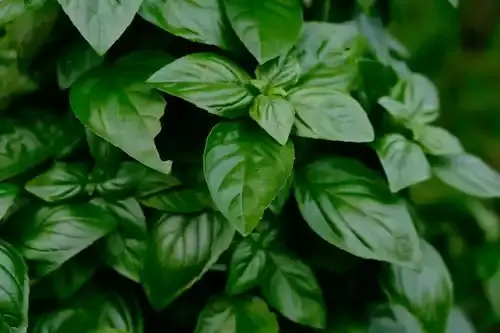
Luck Type: Health
Do you like cooking at home? A symbol of wealth and overall health, basil is one of the most popular herbs in agriculture. According to comprehensive herbal medicine, basil leaves can treat colds, inflammation, and circulation. For this reason, basil is thought to expel bad energies.
This good luck plant needs a lot of sunlight and water. Since it's often used in cooking, you'll want to place it in your kitchen or dining area – and learn how to properly store your herbs for maximum freshness.
Chrysanthemum
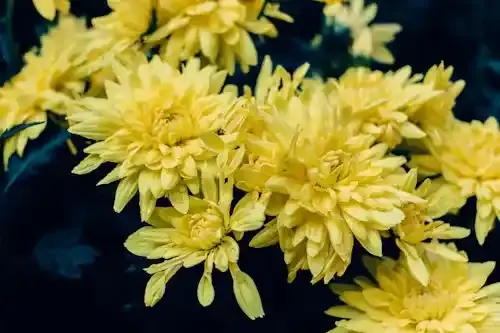
Luck Type: Longevity
"Chrysanthemums bloom in late fall and early winter, making it a symbol of longevity," says Hyder. Chrysanthemums, especially sun-like yellows, can bring happiness to the house. Which means that the good luck plant symbolizes not only long life, but also longevity in health, happiness and harmony.
Although it is often used as a cut flower placed in a vase, it can be grown indoors. You will want to find a potted plant if you intend to grow it in your home. Chrysanthemums, like their sunny temperament, require warmth and regular watering.
Chinese Money Plant
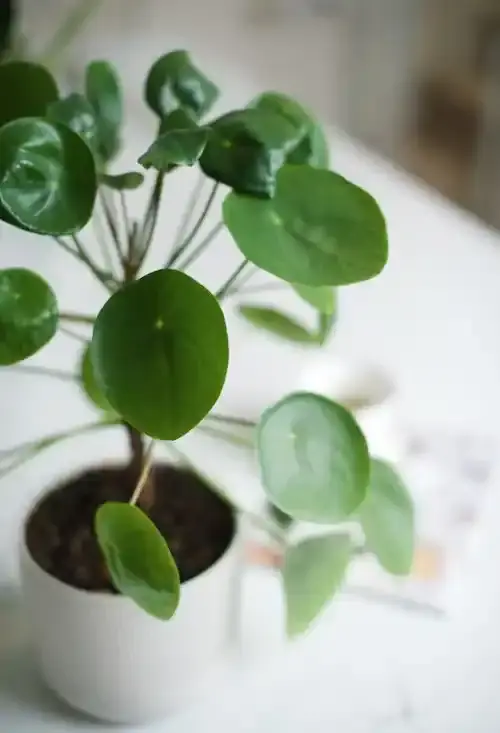
Luck Type: Money
Pilea peperomioides, often known as the Chinese money plant, is one of the most powerful plants of good luck when it comes to financial wealth. Also known as the UFO plant or coin plant, Hyder says, this small indoor plant "not only has round, coin-like leaves, but also creates branches that represent more pathways to financial success."
Unlike other sun-loving plants, Chinese money needs indirect sunlight. The soil of the plant should be allowed to dry out before watering it well about once a week. Although the plant can bloom outside, you shouldn't expect the plant to produce flowers indoors.
Cactus

Luck Type: Border Mode
Hyder says that in Feng Shui, cacti, a type of succulent plant, can be a controversial plant to incorporate into the home. The thorny thorns of the plant can look aggressive and dangerous. Many feng shui experts may argue against putting cacti in the house at all, especially in the bedroom, because those who sleep in that room may adopt the thorny attitude. However, aloe vera is a popular houseplant because it comes in many varieties and caring for succulent plants is generally easy.
Hyder says cacti can also represent the importance of setting boundaries. The placement of the cactus plant should be accurate, such as next to the cabinet if it is larger or on the bookshelf if the plant is on the smaller side. Aloe vera can also absorb argumentative energies, but if you start to feel nervous or upset, check the position of the aloe vera.
Fittonia
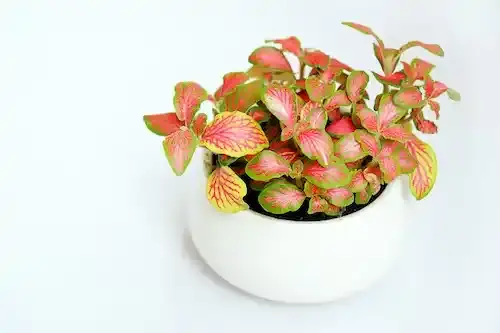
Luck Type : Compensates for Negative Energy
Fitunias, or nervous plants, are known for their vibrant pink or white veins that stand out on dark leaves. Apart from its attractive nature, it is one of the good luck plants that represents growth and renewal. Despite their small size, these plants radiate good energy and can compensate for the negative energy that accumulates in less used places. Best suited for a basin or bath with indirect sunlight, this tropical plant is generally low-light indoor and requires frequent watering.
Ivy
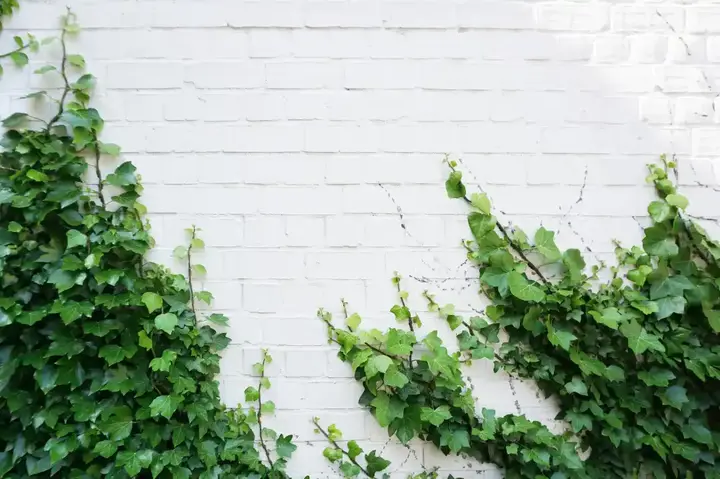
Luck Type: Restoration
Ivy is a great air-purifying plant, which is why you might see it in your local coffee shops. What's more, Hyder highlights that ivy represents "friendship and patience because it sticks securely to things." In addition, this good luck plant brings happiness, positivity and restorative energy.
Ivy requires very low care, and can maintain itself in dark places, making it a great plant for areas that receive very little energy flow. Ivy can revive spaces, such as cabinet surfaces and hard-to-reach corners that limit the positivity of your living space.
Peony
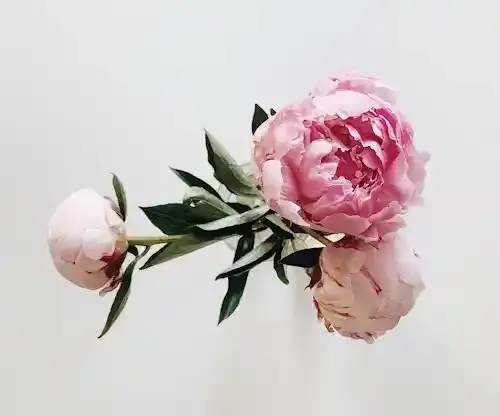
Type of luck: love and healing
The peony, known as the king of flowers in China, is a symbol of prosperity and nobility, according to Haider. Flowers have a special meaning because of their beauty and because in nature they provide fragrant aroma and food in the form of nectar. Peonies reflect their natural state, they bring beauty, love and healing – the meaning behind the name of the flower, after all, comes from Bayonne, the Greek doctor of the gods.
Yellow and purple varieties are considered to be of the highest value due to the association of colors with royalty. And while you might think that peonies can only be grown outdoors, smaller varieties of the plant, such as Chinese peonies, can be grown indoors – you'll only need at least one foot and one foot deep. These plants tend to thrive in cool temperatures with at least five hours of direct sunlight.








